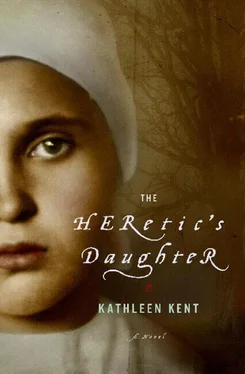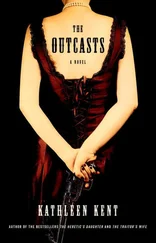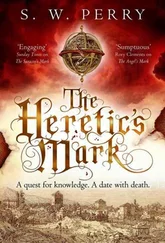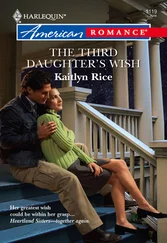I thought of Uncle, his coat reeking of some sweet foreign fragrance, staggering about the common room, and blushed again to think of him in such places. I could not imagine where Margaret could have gotten such knowledge, certainly not from Aunt. I asked gently, “Is that where Uncle goes of an evening?”
She idly plucked a strand of straw from my skirt and was quiet for a moment, as though doubtful of revealing more. Finally she said, “I followed him out one night. It was an evening last summer. I heard him leave long after Mother had gone to bed. They had argued about his absences. They thought Henry and I were sleeping, but I could not sleep. I heard Mother say to him that if he could not be a decent husband, he should go and live with his whores and be done with it.”
A deep crease had formed between her brows, making her seem suddenly much older. “It is but two miles to the tavern, and when I crept up and peered through the shutters, I saw him. I saw Father at his cups and there was a woman seated with him. She was coarse, with rolls of fat and hair the color of old copper… . I heard things…” Two bright spots of pink showed through the opaque white of her cheeks but her eyes were vacant and staring. “Father would never have done such things, or said the things he has said, if the woman had not entranced him. So I set a curse on her that she would die before the year was finished.” She turned to me then, her lips parted and unsmiling. “She caught the pox last November and died.”
How often had I heard Uncle claim to work contrary magic on a witch. He had once said, “To kill a witch with conjuration is a service for the good.” But the thing Margaret had claimed to do, even towards saving her father, made a trembling start up in my middle and I clutched at my own shoulders for comfort. If it was so, that the copper-haired woman had bewitched Uncle, her enchantment crept past the grave, for what else could explain his continuing slide into vice? Margaret reached out and I let her pull me into her warmth. She said softly, “You must promise me, Sarah, that you will not let Mother hear you ask where Father goes. It upsets her so.”
She rocked me like a babe, my head on her shoulder, until my fearful quivering had stopped. That she had entrusted me with such a secret made me love her all the more. And if I in that moment also feared her, it only worked to add to her mystery and wonderful strangeness. By the time we had shut up the barn to return to the house, we had agreed to name the last piglet Jezebel.
THE END OF March is often the cruelest time in the year, as the air will of a sudden turn warm and moist and bring a promise of a great thaw. And no sooner are the doors opened and the heavy cloaks and woolen wrappings laid by than the cold, killing winds prick cruelly and drown the world again in snow. It was during such a false spring that Uncle announced we were to have as a guest the Reverend Nason of Billerica. The Reverend, so he said, was a man of great respectability and no mean intellect. He was to come in two days’ time. Hannah and I were to be hidden in Margaret’s room, where we would take our supper. The sight of us would bring too many questions.
Aunt was not a little anxious about the preparations. Between the frenzied movement of furniture and the airing out of linens, Margaret and I were put out a dozen times to collect water from the ice for cleaning and cooking. On the day the Reverend was to attend us, I was sent for roots for the pot. I sat in the cold-cellar, sorting through a basket of apples, my face long and dark. The open trap allowed only a little light into the hollowed space, the far walls receding into murky vapors.
I was bitterly disappointed to be banned from the evening’s company for not only was the Reverend to be there but also Margaret’s elder brother, Allen. The porridge I had eaten for breakfast soured and turned to goose eggs in my stomach. I looked again at the apple as it lay in the hollow of my apron. The pearly inside of the meat had remained unchanged for months, the skin darkening to a dull rust. But I had pierced the skin with my teeth and like a shadow stealing overhead, the whiteness had turned to yellow and brown.
Before dark Hannah and I were given food and sent to Margaret’s room. Upon sunset the Reverend Nason appeared at the door. Margaret had shown me a chink through the wall for a spy hole, and, putting my hand over Hannah’s mouth, I placed my eye at the opening. The Reverend was a man of prodigious size but with a remarkably small head. His skin was pale and glistening, as though brushed with the white of an egg. His eyes were settled deep into his face, and his ears were dainty for so large a man. He looked like an immense loaf of bread too well seasoned with baker’s yeast. And yet I held my breath, for so keen was his gaze about the room that I felt surely he must see my eye pressed against the peephole. He took stock of every homely item, fingering the linen on the table, testing the joints on every chair, hefting the pewter mugs to test their weight.
Allen followed shortly after, and from the start I did not like him. He was dark with a high forehead like his father but with a face narrow like a ferret. His lips were full and out of proportion to his eyes, which were set too close together to be pleasing. The set of his face was of someone tasting bread soaked in vinegar, and I could well believe that he was a man who would find pleasure in the plaguing of small children or the needless hectoring of animals.
The Reverend praised Aunt’s cooking, invoking the Bible in defense of his gluttony. “As you know, Goodwife Toothaker,” he said, spilling food on the table from his mouth, “in Isaiah, chapter twenty-five, verse six, the Almighty’s good graces are also brought about through the bread at table. Truly this repast is a worthy companion to the soul’s feast of God’s holy word.” One would have thought Aunt had served up angel’s bread rather than an aged and pungent spit of mutton. As he chewed, he pulled pieces of gristle and fat from between his teeth and wiped his oily hands on his trousers. In awe of the sound of his own voice, the Reverend closed his mouth only to swallow. And, as Uncle and Allen were eager to be heard, one would hardly finish speaking before the other would launch himself over the last word. At times the three would speak all at once, sounding like Dutch merchants on market day.
My eyes grew heavy until I heard the Reverend saying, “The pox has run its course, it seems. Only six people dead this past month. Three of them from a Quaker family, one of whom was a runaway. We can all thank God He has rid us of three more heretics.”
“Have you heard how fare the neighboring towns?” asked Aunt, twisting the table linens in her hand.
“I have not, Goody Toothaker. The inclement weather has kept us prisoners in our homes. But I have recently had a letter from a fellow theologian in Boston. He said the smallpox has come. As well as an outbreak of… strange disturbances.” He waggled his fingers about at the last, imitating a flock of scattering birds.
“Disturbances?” Uncle asked, the corners of his mouth turned down.
“Witchery. Spells and incantations. My colleague has taken the belief that disease follows a decline in virtue and brings a rise in witchcraft. In the same fashion that foul vapors arise from a bog. He remembers me the case in the south of Boston not two years past of an outbreak of smallpox at the same moment that a Mr. John Goodwin, mason by trade, and his entire family were plagued by stupendous witchcraft. I say ‘stupendous,’ as these were the very words used by Cotton Mather in his writings of a woman named Glover who was charged with these happenings.”
Not to be outdone, Uncle motioned for Margaret to stand in front of the Reverend and said with pride that he had trained his daughter how to sight a witch. The Reverend gestured for her to come closer. “Now, here, sweet child. Tell me what you know.”
Читать дальше












